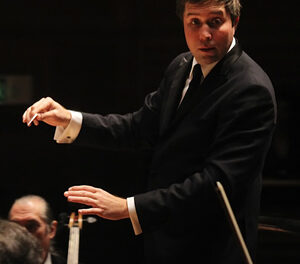College campuses, performing arts centers, and even living rooms across the world celebrate the year 2010 as the 200th birthday of both Frédéric Chopin and Robert Schumann, two of the finest Romantic composers. Everyone from the eager student to the world-class pianist is trying his hand at interpreting and performing some of the most difficult — and beautiful — music of all time.
Duke University played its important part in the festivities by hosting a Chopin-Schumann festival which included a piano and chamber music concert featuring pianists Mayron Tsong and Derison Duarte as well as four string players: Nicholas DiEugenio and Jubal Fulks, violins, Yoram Youngerman, viola, and Alexander Ezerman, cello. The program was a Romantic field day, boasting a huge variety of works by both Chopin and Schumann, from the sorrowful, mysterious atmosphere of Chopin’s Nouvelle Etude in F minor to the persistent, joyful character of Schumann’s Op. 44 Quintet.
Mayron Tsong opened the evening with three Chopin pieces: Prelude No. 25 in C sharp minor, Op. 45: Sostenuto; Barcarolle, Op. 60; and Scherzo No.1 in B minor, Op. 20. The manner in which she approached the piano invited audience members to relax and listen to her cantabile tone, although the acoustics of the hall were not ideal for the sound to carry to the back of the auditorium. The interpretation of the Scherzo was particularly impressive. Tsong gave the piece a huge amount of direction and momentum, and her tone in the middle section was exquisitely touching. Her nonchalant, seamless transition back the “A” section evoked a powerful mood of excitement.
Derison Duarte next came on stage to finish out the first half of the evening with two more Chopin pieces, the Nouvelle Etude in F minor and yje Polonaise-Fantasie, Op.61. The melody in the etude could have projected better into the hall but, again, the acoustics were not helpful in carrying much sound past the first few rows. Duarte’s second piece, the Polonaise-Fantasie, was convicting and impressive from the opening. The slow cadenza-like passages that emerged again and again throughout the piece were played with beautiful tone and shape. Duarte possessed an excellent sense of timing as well, especially in the rhythmic climax near the end.
The flavor of the evening changed from solo works to chamber music with the appearance of Yoram Youngerman with Mayron Tsong. They joined forces to perform Schumann’s Märchenbilder, Op. 113. Youngerman’s viola took charge of the second movement, enhancing its confident, playful character. The third movement displayed the sensitivity of both artists with the incredibly soft, enchanting notes and dramatic dynamic swells. The ensemble was remarkable. The duo ended with the broad fourth movement, played with kind feeling and long phrases not easy to forget.
After a parade of tantalizing Romantic treats, it hardly seemed likely that the performers had saved the best for last, yet the closing piece, Schumann’s famous Piano Quintet in E-flat major, Op. 44, truly lived up to its reputation as one of the most fascinating and beautiful chamber music pieces ever composed. Nicholas DiEugenio, Jubal Fulks, and Alexander Ezerman joined Youngerman and Tsong and launched into the first movement with zest and drive. DiEugenio convincingly led the quintet with passion and purpose throughout every movement. The second movement, known for its breathtaking silences and quiet suspense, held together remarkably well and created a magical effect. The ensemble displayed a marvelous dynamic range and use of color. The technique of everyone in the quintet was at its best in the impressive third movement with its fast, bubbly passagework.
The evening ended most satisfyingly with the fourth movement, building to its climax, a double fugue using the main theme from both the first and fourth movements. From start to finish, it was chamber music at its best, a fitting finale to an evening full of music that represents the best of the Romantics.
*The author is a member of our ongoing internship program at Meredith College.











